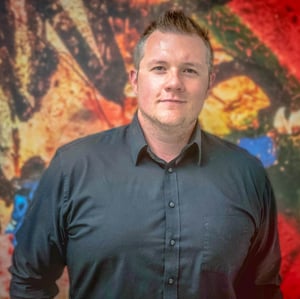Do you know what recruiters are looking for when they read your resumé? There could be bits of key information that you may be missing that could hurt your chances of getting hired. We sat down with IntelliSource Recruiter, Kurt Cushman, to learn more about what he looks for when hiring new candidates.

“I think the real trick to writing meaningful resumes revolves around playing to your strengths. Every situation, person, and job are different, so saying there’s one resume style that trumps all is a misrepresentation. Here are just a few things that I have seen that stand out and can help you get noticed for an interview opportunity”
-Kurt Cushman, Recruiter for IntelliSource
Add Your Strengths at the Top of Your Resume
Graduated Magna Cum Laude from Harvard with education being your strong suit? Add that first! Do you have tons of skills that are highlighting your ability for the job? Add that first! Take the best you have to offer to the company and highlight those strengths.
Highlight Tenure at Previous Jobs
Make sure to put the dates on the same line as your job title in bold. For instance:
Recruiter: May 2014 – May 2018 IntelliSource
This will help you stand out for those jobs you spent a lot of time at and can help you get a look for a position looking for long-term commitment candidates.
Keep the Writing to a Minimum
Many people fall prey to resumes that turn into a short story. The purpose of a resume is to give a quick snapshot of experience, skill, and education/certifications. Don’t give enough information that your resume could suffice for an interview. Just like when you are taking notes in class, a few bullet points for each position of job responsibilities, and possibly a major achievement or two, is plenty. The rest of the achievements and responsibilities can be vetted through the interview process.
Follow the Old Adage of “Short and Sweet”
This expands on “keep the writing to a minimum”. Unless you have worked only one position for 10+ years, there is rarely a reason to list any experience past a decade. Very few positions require more than 10 years of experience in a field; and in today’s ever-changing world, any experience that happened prior to 10 years ago is rarely relevant to what that job would entail today. I have almost never seen a resume that has gone beyond 2 pages that I thought needed to. If you notice your resume start to get drastically long, start by removing any experience that isn’t relevant. If you are concerned about there being a large gap in your employment history, you can keep the experience listed, but don’t list any responsibilities or achievements.
Don’t Add References or Your Exact Address to a Resume
Add the city and state that you are located in, but not the exact address. As long as we know generally where you are located, that is enough. Any further questions about commute/relocation can be addressed in the interview. Concerning references, any employer/recruiter that requires them is aware that they can ask for references, you don’t need to list them or that they are “available upon request”
Put Job Title’s Before the Company and Make Sure it Stands Out
The purpose of this is to make sure the hiring manager, HR representative, or Recruiter, can tell if your experience is relevant immediately.
Don’t Make it Too Fancy or “Loud”
While a colorful, eye-popping resume is fitting in some occasions (such as with a Graphic Designer), an unnecessarily complicated resume can make it appear like you are attempting to compensate for lack of skill or experience.
Following these tips from Kurt, you can help put yourself in the best possible position to get an interview for jobs you are applying for.






Leave A Comment
You must be logged in to post a comment.